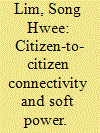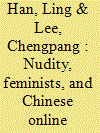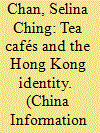|
|
|
Sort Order |
|
|
|
Items / Page
|
|
|
|
|
|
|
| Srl | Item |
| 1 |
ID:
170189


|
|
|
|
|
| Summary/Abstract |
This article takes as its object of analysis the term ‘little freshness’ (xiao qingxin 小清新), which has been coined to describe a variety of cultural products and phenomena, mostly emanating from Taiwan but circulating across the Taiwan Strait. It argues that little freshness is a manifestation of subcultures that have been initiated, appropriated, and consumed by youths in the region. This citizen-to-citizen connectivity reworks Joseph Nye’s notion of soft power by shifting the focus away from state agents and by reversing the direction of soft power flows to claim agency at the sites of reception. The article provides two case studies to demonstrate how an imaginary about Taiwan’s cleanness, clearness, and freshness has been projected by the media in the People’s Republic of China as a form of discursive construction and by Hong Kong citizens of Taiwan as a desirable destination for emigration. Finally, the article situates the little freshness phenomenon in relation to a propensity towards miniaturization in cultural formation in the region, and suggests that this propensity is inflected in a structure of feeling about generational injustice in the face of neoliberal capitalism.
|
|
|
|
|
|
|
|
|
|
|
|
|
|
|
|
| 2 |
ID:
170191


|
|
|
|
|
| Summary/Abstract |
Drawing upon ethnographic data collected from fieldwork among a reading-based community in a coastal city over 10 years, and Michel Foucault’s notion of the cultivation of an ethical self, the primary aim of this study is to examine three issues: (1) how do middle-class citizens articulate and practise the cultural activities that they advocate?; (2) are their practices simultaneously individualized and totalized in the way that Foucault demonstrates?; and (3) do these internally oriented practices have civic significance?
|
|
|
|
|
|
|
|
|
|
|
|
|
|
|
|
| 3 |
ID:
170192


|
|
|
|
|
| Summary/Abstract |
Because of the heavy burden that the resolution of social conflicts imposes on the Chinese government, the government is motivated to delegate or shift its conflict resolution responsibilities to specialized institutions, including social organizations. However, the effectiveness of responsibility shifting is conditional on the types of conflict and social contexts. Focusing on the resolution of medical disputes in China, this article examines the conditions under which the government can avoid direct and heavy involvement in dispute resolution. The government can effectively delegate the responsibility for resolving conflicts when the disputing parties perceive the mediation agencies as impartial. Having effective institutions thus limits government intervention to only a small number of disputes. This study is based on an analysis of 1351 medical disputes and about 80 interviews with parties involved in dispute resolution.
|
|
|
|
|
|
|
|
|
|
|
|
|
|
|
|
| 4 |
ID:
170188


|
|
|
|
|
| Summary/Abstract |
Chinese feminist activists are actively participating in the Chinese online public sphere. In this study, we examine a case – the Anti-Domestic Violence with Nude Photos Campaign (裸照反家暴活动) – and the response of Chinese online censorship to this campaign. Campaign activists used nude photos to mobilize the public’s support. According to the existing theoretical perspectives such as the collective action potential theory, this kind of online campaign with pornographic elements and the potential to mobilize people is very likely to be censored. Counter to this expectation, we found that not all of the original photos were removed. Our finding suggests that the interactive manner in which activists responded to the public on SinaWeibo’s discussion threads matters in terms of the degree of censorship. This study complements the existing studies on the Chinese online censorship system, echoes scholars’ call for studies on censorship from a more interactive angle, and furthers our understanding of the Chinese feminist movement.
|
|
|
|
|
|
|
|
|
|
|
|
|
|
|
|
| 5 |
ID:
170187


|
|
|
|
|
| Summary/Abstract |
In the two decades after 1995, the Chinese Communist Party (CCP) executed a significant philosophical shift in its relentless struggle for legitimacy and relevance through the Sinicization of Marxism (马克思主义中国化). Following the pattern of many other political reorientations, the party undertook a reassessment of a prominent historical figure to conduct ideological work – in this case, a leading May Fourth intellectual, Hu Shi. For decades the orthodox CCP view of Hu had been uniformly negative, but from 1995 onwards the People’s Republic of China’s establishment intellectuals presented a more positive appraisal of his impact on Chinese history. Previous scholarship on the rehabilitation of Hu argues that the shift reflected the more liberal academic and political climate of the times. This article argues however that the reappraisal of Hu enabled the CCP to manage a key problem in its political identity – the disjuncture between revolutionary Maoism and reform-era policies captured by the slogan ‘socialism with Chinese characteristics’. By analysing the discussion on a key 1919 debate – known as the ‘problems and isms’ debate – I show that the CCP used Hu’s philosophical ruminations to trace the Sinicization of Marxism from the moment Marxism entered China to reform-era socialism with Chinese characteristics, and in the process it diminished the role of revolutionary Maoism. In so doing, the CCP consolidated legitimacy through showing its leading role in the historic Sinicization of Marxism without Maoism.
|
|
|
|
|
|
|
|
|
|
|
|
|
|
|
|
| 6 |
ID:
170190


|
|
|
|
|
| Summary/Abstract |
This article examines the meanings of caa caan teng (茶餐廳, local cafés) in Hong Kong and the implications of such cafés on the Hong Kong identity. It argues that the local café is a representation of Hong Kong culture because it reflects Hong Kong’s political, economic, and social developmental paths and mirrors the everyday life of its people. I investigate how the interaction of different immigrant cultures in Hong Kong has resulted in the invention of hybrid foods at the local café. These foods demonstrate hybridity as the transgression of boundaries through the negotiation of cultural differences among migrants, as well as those between migrants and colonialists. I argue that hybridity in local cafés reflects the power relations among the locals in Hong Kong, between locals and colonialists, and between locals and the new authorities in Beijing. Hybridity found in local cafés symbolizes the Hong Kong identity, as an entanglement between the multiplicity of Chinese ethnicities and the colonial modernity as characterized by flexibility, efficiency, choice, and diversity. These features differentiate the Hong Kong people from the colonialists and the mainlanders, thus constructing their identity and subjectivity, as former colonial subjects now living in the ‘periphery’ of the motherland.
|
|
|
|
|
|
|
|
|
|
|
|
|
|
|
|
|
|
|
|
|